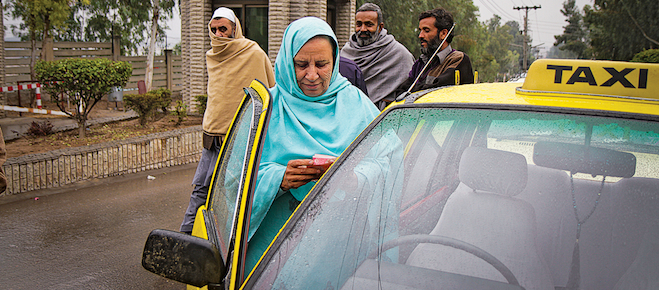The only female taxi driver in Pakistan
Zahida Kazmi has survived deadly roads, a fatwa and family abandonment
Rawalpindi, Pakistan Zahida Kazmi counts her cash after dropping off a fare in Rawalpindi, Pakistan, near the capital Islamabad. Photo credit: Zayer Hassan
Share

When it comes to rating her driving skills, on a scale of one to 10, Zahida Kazmi considers herself an 11. “I’m a better driver than most of the men on the road,” says the 57-year-old. “That’s why I get all the good fares.” Kazmi’s confidence is the product of two decades of doing what no other woman in Pakistan does: drive a taxi. In such a deeply patriarchal society, surviving so long in an industry run by men—and in a country notorious for its deadly roads—is a cause for celebration.
Becoming a taxi driver never frightened her, Kazmi says, sitting upright in her modest house in Rawalpindi, 15 km from Islamabad. “I was a widow with six children. They were my only concern. I wanted to give them a good life and a good education. I had a gun and, being a Pashtun, I knew how to use it. Sure, it was tough at first. The male drivers didn’t accept me, and the taxi drivers’ union refused to help. But once they realized I was serious, and they understood the position I was in, they accepted me.”
For the first few months on the job, Kazmi wore a burka. It was a sort of shield she thought would protect her from the lewdness of some men.
But that sort of behaviour never materialized. “I took the burka off once I realized that my customers were normal, respectful people,” she says. In fact, over two decades of driving, Kazmi has never had to face the kinds of problems female taxi drivers in Canada or the U.S. face: sexual harassment or drunk customers who turn violent. In Pakistan, where alcohol is banned and harassing a woman in public can very easily lead to a sound beating, the immediate dangers are non-existent.
But there are other difficulties, rooted in culture, that have taken their toll on Kazmi. When she first began driving, her family disowned her. More ominously, when word got out that there was a female taxi driver taking to the streets of the Pakistani capital, Abdul Aziz Ghazi, the ultra-conservative Islamabad imam, issued a fatwa against her, calling on Muslims to kill the woman flagrantly breaking the tenets of Islam by being in the presence of male strangers without a chaperone.
Nothing ever happened, however. Kazmi has won the admiration of her fellow drivers, serving as president of the taxi drivers’ union and chairwoman of the Yellow Cab Association. Even her family has come around. “Now that I’m famous, they want to have contact with me,” she says, smiling wryly. “But I’ve disowned them.”